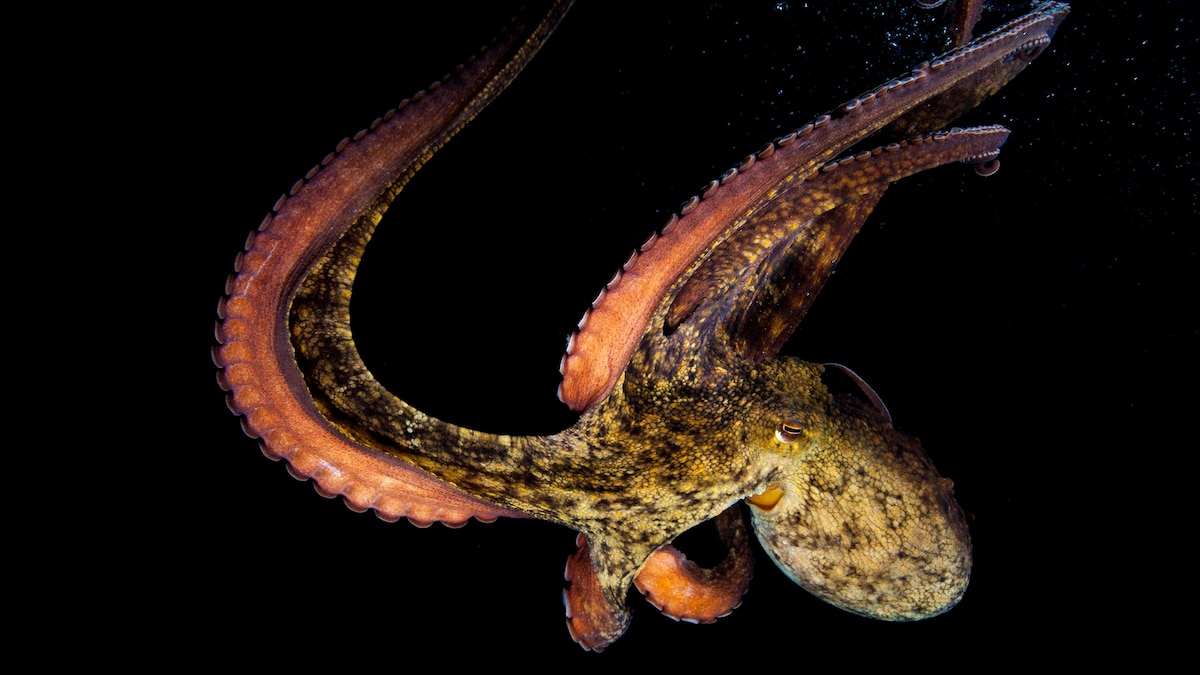Published December 14, 2022
5 min read
For its distinctive way of defending its boundaries, consider Octopus tetricus, aka the gloomy octopus. If another creature gets too close, this octopus will respond by throwing things, according to a new study published recently in the journal PLOS ONE.
Native to subtropical seas off New Zealand and eastern Australia, these cephalopods recently were caught on camera throwing shells, silt, and algae at intruders who ventured too near their dens—the first time a throwing behavior has been reported among octopuses. The targets of O. tetricus—also called the common Sydney octopus—included various fish, underwater cameras, and even each other.
Though scientists aren’t totally sure what motivates the behavior, it may have something to do with “the octopus equivalent of personal space,” says Peter Godfrey-Smith, a professor at the University of Sydney in Australia and lead author of the study.
Aggression at close range
Godfrey-Smith and his colleagues collected dozens of hours of footage of gloomy octopuses near their dens in Australia’s Jervis Bay—and between 2015 and 2016, they observed more than 100 instances of the cephalopods chucking shells and silt. Because gloomy octopuses are abundant but space is limited space in Jervis Bay, the normally solitary animals are forced to live in close quarters, Godfrey-Smith says: “At this site, we see a lot of arm-pokes, probes, a bit of wrestling, and the like.”
About half of the hurling attacks Godfrey-Smith and his colleagues captured on camera appeared to be the result of one octopus invading another’s turf—and 17 percent of those attacks landed a hit on the invader. Although determining an animal’s intent is difficult, “I think it is likely that some of the hits are deliberate,” Godfrey-Smith says.
In other instances, the octopuses were observed using their throwing skills to toss shells and food scraps out of their dens. (Read why octopuses remind us so much of ourselves).
Jet-powered projectiles
To execute their throws, gloomy octopuses scoop up debris with their arms and shoot it toward their target with a powerful jet of water from their siphon, a tubular structure they use to pump water out of their bodies. Using this technique, the cephalopods can propel materials as far as several body lengths away.
Octopuses can change the color of their skin at will to camouflage or communicate, with dark colors generally associated with aggression. The researchers observed that dark-colored individuals tended to hurl objects with more force and were more likely to hit another octopus. They also noticed that octopuses caught in the line of fire often responded by dodging or raising an arm in the direction of the attacker.
In the footage collected by the researchers, the octopuses appeared to adjust their throwing angle and degree of force when throwing things at their own kind. And in octopus-on-octopus attacks, the most popular artillery used was silt.
Anti-social social club
While throwing things at one another may not help humans solve their problems, such behavior may “help manage social interactions where octopuses live in close proximity,” says Chelsea Bennice, a marine ecologist with Florida Atlantic University. Tossing shells and blasting silt at one another may be how these octopuses defend their territory or tell potential mates they aren’t interested.
For example, the researchers observed one female octopus hit her male neighbor with silt five times over the course of roughly four hours after he made several failed attempts to mate with her.
Regardless of what motivates this behavior, the fact gloomy octopuses engage in it at all sets them apart from the majority of animals. Only a small number of animals are known to throw things. An even smaller number—all of them highly-social mammals—are known to target other animals when they throw.
Octopuses generally have been thought to live solitary lives. However, the discovery that gloomy octopuses are undersea snipers is one of several recent revelations about the social lives of octopuses that suggest these highly intelligent creatures may be more social than previously thought.
“With the advancement in technology, we are able to capture more of the underwater world and understand the fascinating behaviors of the most intelligent invertebrate,” says Bennice. “I look forward to seeing what additional videos can reveal.”

